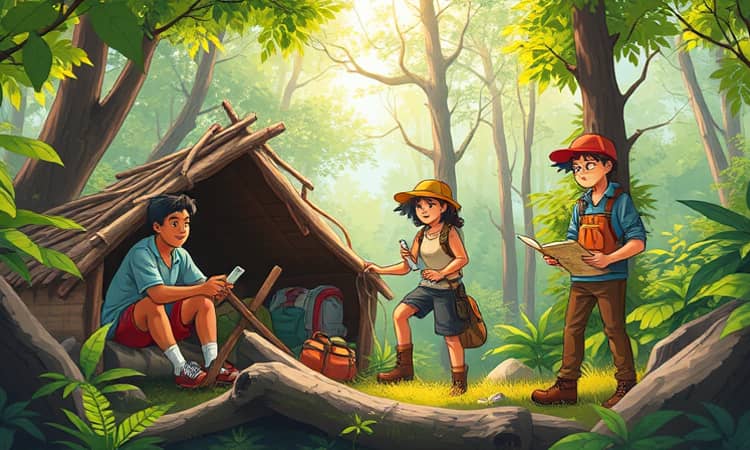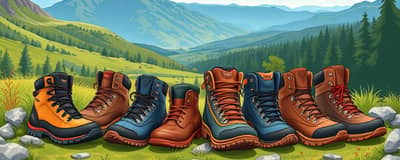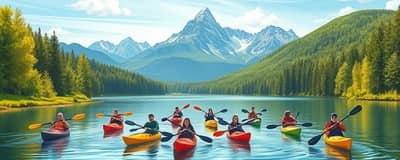In today's fast-paced world, knowing how to survive in the wilderness is a crucial skill for adventurers, campers, and anyone who enjoys the great outdoors. Whether you're preparing for a hiking trip or just want to be prepared for any emergency task that nature throws your way, understanding the basic skills of outdoor survival can make all the difference.
Outdoor survival skills can mean the difference between life and death in unexpected situations. From building shelter and finding food to navigating using natural clues, these abilities empower individuals to thrive in challenging environments. Therefore, equipping yourself with these essential skills before embarking on an adventure is vital.
This guide presents ten essential outdoor survival skills that everyone should know. By mastering these skills, you can enhance your safety and confidence while exploring nature.
1. Build a Shelter
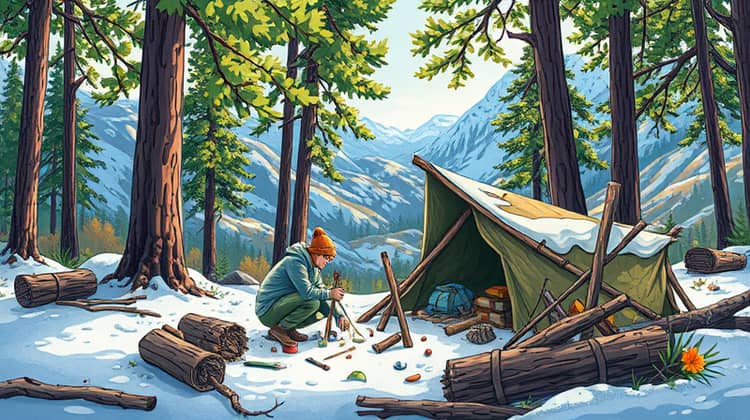
Building a shelter is one of the first priorities when you find yourself in the wilderness. A good shelter provides protection from the elements, whether it's rain, wind, or extreme temperatures. Understanding how to construct an adequate shelter can mean the difference between discomfort and survival.
In the wilderness, natural materials such as branches, leaves, and even snow can be used creatively to create a functional shelter. The type of shelter you build will largely depend on the available resources and the climate conditions of the area.
Essentially, building a shelter is not just about having a roof over your head; it’s about ensuring your safety and comfort in an unfamiliar environment. By learning how to find or construct a shelter, you equip yourself with one of the most important survival skills.
- Look for a suitable location away from hazards like falling branches or flooding.
- Gather materials such as sticks, leaves, and moss.
- Create a frame using sturdy branches and cover it with leaves or foliage for insulation.
2. Find Clean Water
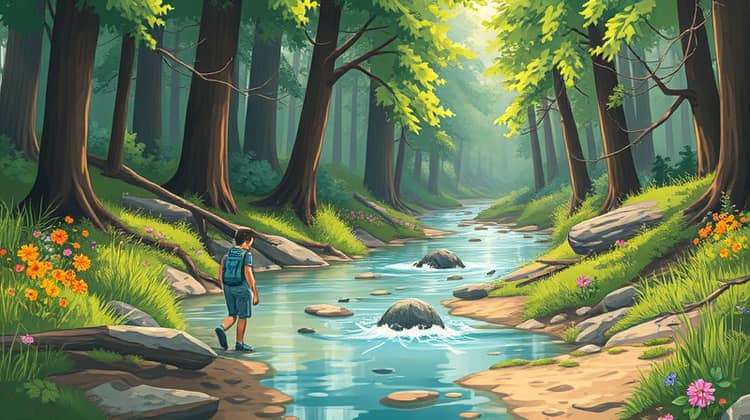
Finding clean water is an absolute necessity for survival, as humans can only live for a few days without it. However, locating drinkable water in the wild can be challenging. Knowing where to look and how to purify water can help you stay hydrated and healthy.
Water sources include rivers, lakes, and streams, but it's crucial to ensure that the water is free from contaminants. Whenever possible, seek out flowing water rather than stagnant water, as it is more likely to be clean.
In many situations, you can also collect rainwater or dew, which can be safe to drink. Purifying water through boiling or using purification tablets is essential if you're unsure of its safety.
- Look for signs of water such as vegetation or animal tracks.
- Collect rainwater using containers or your hands.
- Purify the collected water by boiling it or using water purification tablets.
Remember, clean water is vital for maintaining body functions, so always prioritize finding a reliable source. Taking the time to properly purify your water can save you from potential illnesses and dehydration. With these techniques, you can confidently ensure that you have access to clean water in any outdoor scenario.
3. Start a Fire
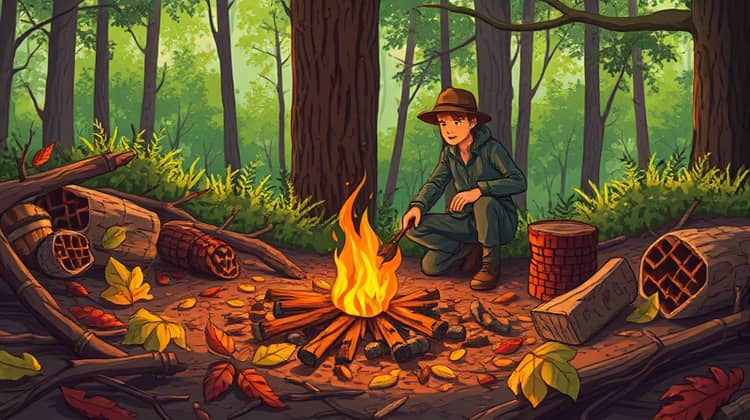
Starting a fire is an essential skill for survival. A fire provides warmth, light, and a way to cook food, in addition to serving as a signal for help. Underestimating the importance of fire can have dire consequences in a survival situation.
To successfully start a fire, you must first gather materials. This includes tinder, kindling, and larger pieces of wood for fuel. Understanding the characteristics of these materials and how they burn is crucial for efficient fire-starting.
Practicing different methods of fire-starting, such as using friction, flint and steel, or matches, can be invaluable. In emergencies, knowing how to improvise with available materials can help you overcome challenges.
- Gather dry leaves, small twigs, and bark for tinder.
- Use larger sticks for kindling once the tinder is lit.
- Add larger logs to maintain the fire once it’s established.
Once your fire is lit, it’s important to maintain it and to ensure it burns safely. Always have a plan to extinguish the fire when you're done, and keep it a safe distance from your shelter. With practice, you can gain confidence in your fire-starting skills, providing warmth and comfort during your outdoor adventures.
4. Identify Edible Plants and Insects

Understanding which plants and insects are safe to eat can be a literal lifesaver in the wild. This knowledge helps supplement your food supply when traditional sources are scarce. Educating yourself on local flora and fauna before heading into the wilderness is ideal for safety.
Many plants and insects are rich in nutrients and can serve as food sources. However, some can also be toxic or harmful if ingested. Learning to recognize the safe ones is fundamental to your survival skill set.
Taking the time to study edible plants, such as berries, nuts, and greens, alongside edible insects, provides a wider range of survival options. Familiarizing yourself with their characteristics can build your confidence when foraging.
5. Basic First Aid
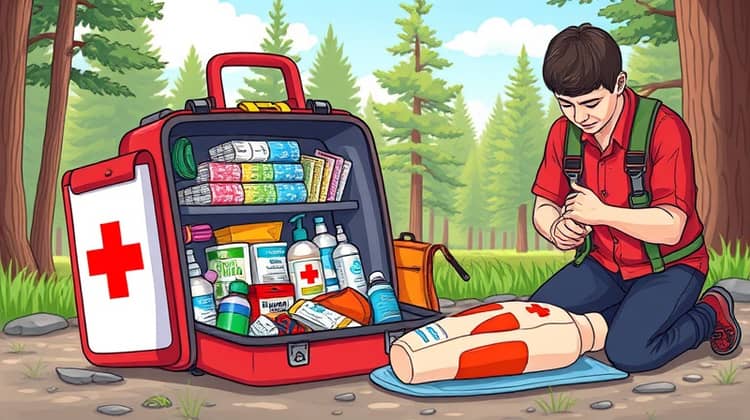
Accidents can happen, even in controlled outdoor environments. Knowledge of basic first aid is vital for treating injuries quickly and effectively. Familiarize yourself with common outdoor injuries and their treatments, which can range from cuts and scrapes to sprains and insect bites.
Carrying a well-stocked first aid kit is essential, but it’s equally important to know how to use the items inside it. Common first aid components include bandages, antiseptics, pain relievers, and tools for treating more severe injuries.
Understanding CPR and other life-saving techniques can also be crucial in emergencies. Regular practice helps ensure you can respond effectively when the need arises.
- Create a first aid kit including essentials like band-aids, antiseptic wipes, and gauze.
- Learn how to treat common injuries such as cuts, sprains, and bites.
- Practice CPR and wound care techniques to be prepared in an emergency.
The more equipped you are with this knowledge, the better your chances of dealing with injuries effectively in the wild. First aid skills not only protect you but can also save the lives of those around you.
6. Navigation Skills
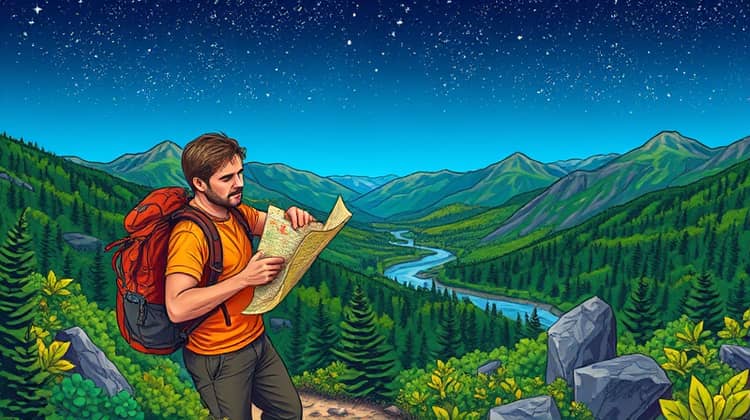
Navigating in the wilderness is a crucial skill that enhances your chances of finding your way back home safely. With technology’s growing dominance, many people have relied solely on GPS; however, knowing to navigate with a map and compass could be invaluable if technology fails.
Familiarizing yourself with map reading and compass skills is essential. Understand how to take bearings and follow them to navigate through different terrains, and always cross-reference with the natural surroundings for accuracy.
Additionally, learning to navigate by the stars and understanding natural landmarks can further enhance your skills. Overall, being able to navigate correctly can save you from getting lost in the wilderness.
- Learn to read topographic maps and understand various symbols.
- Practice using a compass to take bearings and follow directions.
- Familiarize yourself with natural navigation techniques, such as observing the sun and stars.
7. Signal for Help

In dire situations where you may need help, knowing how to signal for assistance can be life-saving. Different methods can be employed, depending on the resources available to you and your surroundings. The primary goal is to attract attention to facilitate rescue efforts.
Visual signals such as bright clothing, mirrors, or fires are effective ways to catch the eyes of searchers. Moreover, audible signals like whistles, shouts, or even signaling devices can communicate your need for help further in situations.
Learning basic signaling techniques and having a plan can improve your chances of getting rescued quickly in a survival scenario. This knowledge can also provide peace of mind when venturing into the wild.
- Create smoke signals using a fire and green vegetation.
- Use a whistle or shout at regular intervals to attract attention.
- Reflect sunlight using a mirror or shiny surface to signal.
8. Fishing and Hunting Basics
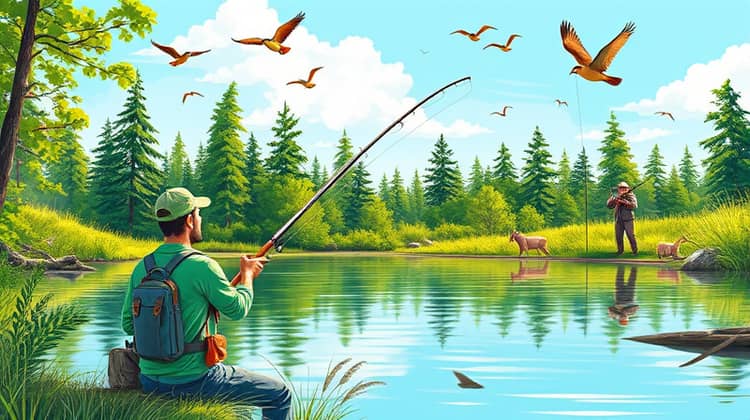
Fishing and hunting can significantly enhance your food supply when surviving outdoors. Knowing the basics of both skills is invaluable, especially if you are spending extended time in the wild. Understanding local wildlife populations and regulations is crucial to protect the environment and ensure your safety.
Whether you use a fishing line, traps, or a bow, learning the techniques for catching fish and small game can provide you with necessary nutrition. Equipping yourself with proper tools and knowledge can make these tasks easier and more efficient.
Practice is key in honing your fishing and hunting abilities. Many outdoor enthusiasts test their skills before heading into remote areas, increasing their chances of success and survival.
- Learn to use a fishing rod, net, or spear to catch fish effectively.
- Familiarize yourself with small game hunting using traps or bows and arrows.
- Practice identifying local edible fish and game to enhance hunting success.
9. Understanding Weather Patterns

Being able to read the weather is a crucial outdoor survival skill. Changing weather patterns can significantly impact your safety and overall outdoor experience. Learning to recognize signs of incoming weather can help you prepare adequately.
Understanding the influence of various weather patterns and how they interact with local geography is vital for outdoor enthusiasts. Factors such as wind direction, cloud formations, and temperature changes can signal impending changes in weather.
By studying these elements, you can make informed decisions about your activities and take necessary precautions to ensure your safety in the wild.
10. Leave No Trace
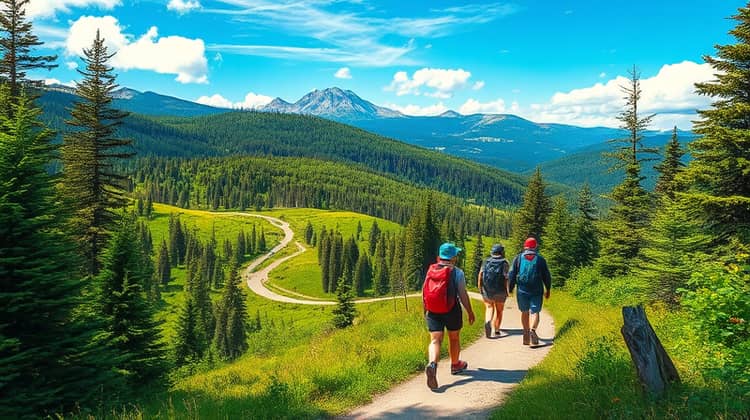
Practicing Leave No Trace principles is essential to preserving the natural environment while enjoying outdoor activities. These principles encourage users to minimize their impact on nature, maintaining the integrity of the ecosystems we cherish.
By incorporating practices such as removing trash, staying on designated trails, and respecting wildlife, you ensure a more sustainable outdoor experience. This responsibility also has educational value, allowing others to enjoy the wilderness responsibly.
Leaving no trace is not solely about personal ethics; it’s a collective commitment to protect the environment for future generations, fostering a deeper connection with nature.
- Plan ahead and prepare to minimize risks.
- Dispose of waste properly and pack out what you pack in.
- Respect wildlife by observing from a distance and not feeding them.
Conclusion
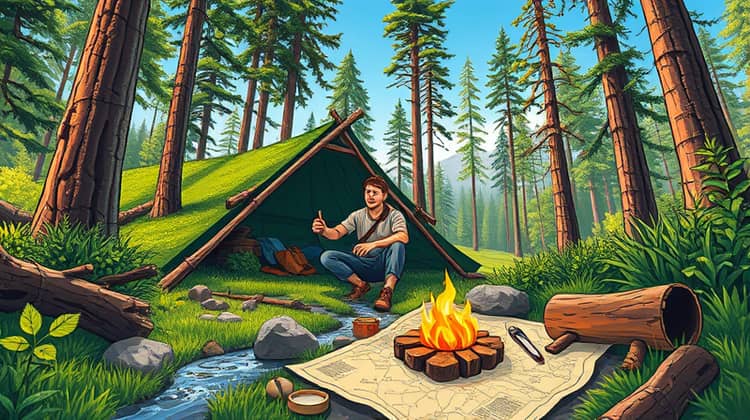
Outdoor survival skills are fundamental for anyone who loves exploring nature. The knowledge of how to build a shelter, find clean water, start a fire, and navigate successfully are just a few of the essentials you can learn to boost your confidence. Equipped with these abilities, you are better prepared for unexpected situations.
The wilderness can be unpredictable, and having the right skills increases your adaptability. Whether it's identifying edible plants or administering first aid, every skill adds to your survival toolkit, making nature a safer and more enjoyable experience.
Finally, committing to environmental responsibility through Leave No Trace principles allows us to sustain our natural surroundings for others to enjoy as well. Taking every opportunity to engage with nature responsibly honors the great outdoors and strengthens your bond with it.

